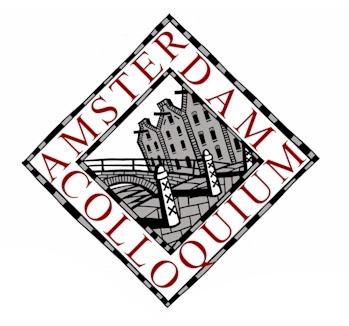The Proceedings of the 24rd Amsterdam Colloquium are available here. Please find a list of the individual papers below.
Beth Lecture
Angelika Kratzer: Possible worlds in a polyphony of meanings
Invited Speakers
Ivano Ciardelli: Questions and their subject matters
Liz Coppock: Toward a common perspective on cyclic, categorical, and scalar division in natural language semantics
Veneeta Dayal: Overtly Marked Mention-All Questions
Salvatore Florio: Singularism, Pluralism, and Definitional Equivalence
Wataru Uegaki: Semantic triviality leads to ungrammaticality through iterated learning.
Eleonore Neufeld: Giving Generic Language Another Thought.
General Programme
Stavroula Alexandropoulou, Kurt Erbach, Richard Breheny, Clemens Mayr, jacopo romoli, Yasutada Sudo: Non-maximality effects in gestural plural predication
Luis Alonso-Ovalle, Bernhard Schwarz: To compose a number is to compose a cardinality: evidence from intensional contexts
Marta Abrusan: Non-factive 'know': What does it mean?
Pranav Anand, Natasha Korotkova: Facts, intentions, questions: English “come-to-know” predicates in deliberative environments
Ido Benbaji-Elhadad, Omri Doron: How is presupposition accommodation constrained, again?
Fenna Berger, Matthijs Westera: Evaluating Unalternative Semantics on a large corpus of naturalistic speech
Maumita Bhaumik: Children’s derivation of scalar inference from or-sentences: Evidence from varying the degree of relevance.
Justin Bledin: Free Choice With Arbitrary Variables
David Boylan: How Conditionals Restrict
David Boylan, Ginger Schultheis: Actuality Entailments and the Conditional Analysis
Tatiana Bondarenko, Richard Luo, Vincent Rouillard: Thinking Statively and Dynamically: a view from Georgian
Lisa Bylinina, Stavroula Alexandropoulou, Yasutada Sudo: Priming NPI Acceptability Judgments and The Bagel Problem
Adina Camelia Bleotu, Mara Panaitescu, Alexandre Cremers, Andreea Nicolae, Anton Benz, Gabriela Bilbiie, Lyn Tieu: More than one way to free choice: A view from child Romanian
Fabrizio Cariani: Default Premise Semantics for Anankastic Conditionals.
Zhuang Chen: Evaluativity in even-hosting comparatives: Information structure and salient scales
Alexandre Cremers: Vagueness and pragmatic reasoning in quantified sentences
Ludovica Conti: Arbitrariness and Frege Arithmetic
John Duff, Daniel Altshuler: Reanalysis in discourse comprehension: Evidence from reading times
Patrick Elliott, Filipe Hisao Kobayashi: Ignorance under attitudes
Kurt Erbach, Stavroula Alexandropoulou, Richard Breheny, Clemens Mayr, jacopo romoli, Yasutada Sudo: Putting summative predicates into context
Anamaria Falaus, Andreea Nicolae: Ignorance and attenuation
Valeria Gradimondo, Lucia M. Tovena, Timothée Bernard: Crossing different ontological domains: the case of "appena"
Yael Greenberg, Hedde Zeijlstra: What is special about special?
Adèle Hénot-Mortier: Scalarity, information structure and relevance in varieties of Hurford Conditionals
Elena Herburger, Paul Portner: Additive Presuppositions and Logical Strength
Angelica Hill: The Case for an Anchored CAUSE
Hitomi Hirayama: A Pragma-Semantic Account for Negative Island Obviation by Wa in Japanese
Yaqing Hu: Same Type of Comparatives, But with Different Syntax and Semantics
Paloma Jeretic, Aurore Gonzalez, Itai Bassi, Kazuko Yatsushiro, Uli Sauerland: DUAL as a core concept and the pronounceability of alternatives
Andrej Jovićević: A Semantics for Weak, Question-Sensitive Belief
Alexandros Kalomoiros, Matthew Mandelkern, Jacopo Romoli, Florian Schwarz: Presuppositions project asymmetrically, unless they don't
Boram Kim: Measuring event participants
Alexander W. Kocurek: Counterpossibles, Functional Decision Theory, and Artificial Agents
Manfred Krifka: Hurford’s Constraint and Disjunctions over Speech Acts
Andrew Kato: Relative quantification and equative scope-taking
Jakob Majdič: Circumstantial indirectness: Future orientation of modals revised
Lera Marinina: Northern Khanty demonstratives: a markedness-based approach
Andrea Matticchio: Neg-raising interacts with implicatures: The case of doubt
Calum McNamara, Xeuyin (Snow) Zhang: Dutch Books, Indicative Conditionals, and Rational Updating
Teruyuki Mizuno: A localist approach to the semantics and distribution of X-marking
Julien Murzi, Brett Topey: What Is Carnap's Problem and How Can We Solve It?
Irina Nemtcova, Jakub Szymanik: Explaining universal semantic properties in the adjectival/adverbial domain
Andreea Nicolae, Yasutada Sudo, Muyi Yang: On the anti-exhaustive inference of ya
Sreekar Raghotham: Loose nominals
Tom Ralston: Generic Explanations for Generics
Valentin D. Richard: Dynamic Effects of Modalized Questions
Tom Roberts: Just-asking questions
Fabian Schlotterbeck, Polina Berezovskaya, Sigrid Beck: Age stratification in collective readings of Present Day English 'every'-DPs
Eli Sharf: What appositives can tell us about names and definite descriptions
Chun-Hung Shih: Generic Modals in Mandarin
Silvia Silleresi, Itai Bassi, Abigail Bimpeh, Imke Driemel, Anastasia Nuworsu, Maria Teresa Guasti: The interpretation of logophoric and ordinary pronouns in Ewe: an experimental study
Torgrim Solstad, Oliver Bott: Causal abductive reasoning in discourse processing: Evidence from eye tracking
Andres Soria-Ruiz: Expressive inferences & mighty obstacles
Peter R Sutton, Hana Filip: Making a statement: eventuality denoting nominals
Maik Thalmann, Andrea Matticchio: On being certain that presuppositions don’t project universally
Jad Wehbe, Kate Kinnaird, Martin Hackl: Distributivity facilitates ACD resolution
Simon Wimmer: Believe is not a propositional attitude verb
Hongchen Wu, Maxime Alexandra Tulling: On the availability of inverse scope reading in Dutch doubly-quantified thetic sentences
Yusuke Yagi, Takanobu Nakamura, Kenta Mizutani: Toward a semantic theory of universal NCIs
Eleonora Zani, Ivano Ciardelli, Emanuela Sanfelici: Testing theories of SDA via acquisition
Ruizhe Zhou, Benjamin Spector, Mora Maldonado: An experimental assessment of the nall lexical gap

